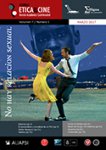A violent alteration. About ethics and philosophy of religion
DOI:
https://doi.org/10.31056/2250.5415.v7.n1.19721Keywords:
Aballay, Philosophy of Religion, Ethics, Alterity, Subjectivity, ViolenceAbstract
In a context characterized by the revival of religions, all too often in their most questionable aspects, it is worthwhile to think from the perspective of philosophy of religion which is the structure characteristic of that experience, in order to both elaborate a critique and recuperate its possibilities for a responsible and free relationship with others. Beginning with the short story and film called “Aballay, the fearless man”, I propose to research what Michel de Certeau and Jean Luc Nancy understand as the “essence” of the religious experience: the possibility of holding unto a relationship with unconditional alterity. Unlike the “domesticated” versions of religious experience, this relationship does not exclude violence, but incorporates it, allowing for multiple resignifications, which can be destructive as well as respectful and responsible for that alterity. For this research I will engage first of all the relationship between the desire of the Other and ethical violence, as it can be seen in Aballay’s transformation. After that, I will study the subjectivity of whoever is “hostage” of this experience of relationship with the Other. Finally I will engage the issue of the possibility of universalization of this experience, in order to show the tension between the impossibility and need of universalization, which is inherent to every ethical and religious experience.Downloads
References
Blumenberg, H. (2008) La legitimación de la edad moderna, Pre-Textos, Valencia.
Casper, B. (2008) Pensar de cara a otro. Elementos del pensamiento de Emmanuel Levinas, EDUCC, Córdoba.
Butler, J. (2006) “Critique, Coercion, and Sacred Life in Benjamin´s ῾Critique of Violence᾿”, en H. De Vries y L. E. Sullivan, Political Theologies. Public Religions in a Post-Secular World, Fordham University Press, New York.
Butler, J. (2005) Dar cuenta de sí mismo. Violencia ética y responsabilidad, Amorrortu, Buenos Aires.
de Certeau, M.; Cifalli, M. (2002) “Entretien: Mystique et Psychanalyse”, Espaces Temps 80-81, pp. 156-175.
Di Benedetto, A. (2010) Aballay, Adriana Hidalgo, Buenos Aires. Gibbon, E. (1781) Decline and Fall of the Roman Empire, Vol. 3 (disp. en http://www.sacred-texts.com/cla/gib, consultado el 2/11/2016)
Girard, R. (1993) La violencia y lo sagrado, Anagrama, Barcelona.
Habermas, J.; Taylor, Ch., Butler, J.; West, C. (2011) El poder de la religión en la esfera pública, Trotta, Madrid.
Heidegger, M. (2003) Aportes a la filosofía: acerca del evento, Almagesto/Biblos, Buenos Aires.
Levinas, E.; Sudar, P. (1979) “¿La filosofía, amor a la sabiduría o sabiduría del amor?”, Teología: Revista de la Facultad de Teología de la Pontificia Universidad Católica Argentina, 33, 63-70.
Levinas, E. (1982) Éthique et Infini, Fayard, Paris.
Levinas, E. (1987) De otro modo que ser o más allá de la esencia, Sígueme, Salamanca.
Levinas, E. (1993) Entre nosotros. Ensayos para pensar en otro, Pretextos, Valencia.
Levinas, E. (1995) Totalidad e Infinito. Ensayo sobre la exterioridad, Sígueme, Salamanca.
Nancy, J.-L. (2008) La declosión. (Deconstrucción del cristianismo, 1), La Cebra, Buenos Aires.
Schmitt, C. (2009) Teología política, Trotta, Madrid.
Schmitt, C. (2011) Catolicismo romano y forma política, Tecnos, Madrid.
Downloads
Published
How to Cite
Issue
Section
License
Los autores que publiquen en Ética y Cine Journal aceptan las siguientes condiciones:
Los autores/as conservan los derechos de autor © y permiten la publicación a Ética y Cine Journal, bajo licencia CC BY-SA / Reconocimiento - Reconocimiento-CompartirIgual 4.0 Internacional. La adopción de esta licencia permite copiar, redistribuir, comunicar públicamente la obra, reconociendo los créditos de la misma, y construir sobre el material publicado, debiendo otorgar el crédito apropiado a través de un enlace a la licencia e indicando si se realizaron cambios.

Este obra está bajo una licencia de Creative Commons Reconocimiento-CompartirIgual 4.0 Internacional.




